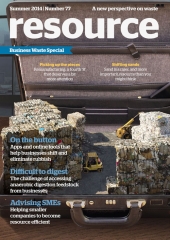Swapping notes
Earlier this year, the new electronic duty of care (edoc) system launched.
Bernard Amos, discusses the opportunity it presents to the UK recycling and resource management sector
Only six weeks after its launch in January 2014, over 1,000 businesses were using edoc to produce and manage their waste transfer notes (WTNs). The new online system developed by the Environment Agency in consultation with the waste and recycling sector provides a free-of-charge alternative to the old paper system, which, quite frankly, was inefficient, out-dated and time consuming. edoc enables businesses to carry out a wide range of tasks, including the ability to: create WTNs and season tickets and share them with relevant parties; review, edit, sign and securely store completed WTNs; review full records and details of WTNs (including when they were completed and who signed them); and track transfers that involve more than one movement.
All waste transfer records in edoc are confidential to the producer and the other party or parties directly involved in the transfer. Other registered edoc users are able to see the business name, address and permit/licence/exemption details, but not details of individual waste transfer records.
At face value, an online system for recording the transfer of waste between parties perhaps doesn’t sound all that transformational. But having been involved in the development of edoc for the last four years, as well as using it as a business tool since its launch, I believe edoc has the potential to deliver real commercial and environmental benefits to the UK waste producers and managers who are prepared to embrace it.
Prior to the launch of edoc, the use of paper WTNs presented a number of practical challenges for both waste producers and those responsible for managing their waste. They were often incomplete, incorrect or out-of-date, resulting in regular issues with compliance and unintentional breaches of duty of care. The need to store information for two years also resulted in a significant administrative burden, as copies would need to be filed or scanned and saved. Businesses also commonly found that data on their waste was either unavailable or could not be relied upon.
 This article was taken from Issue 77
This article was taken from Issue 77 It is the issue of data that presents possibly the greatest opportunity for edoc users. The system will dramatically improve the quality of data available to both waste producers and managers.
This will support those businesses wanting to use their environmental performance to differentiate themselves from their competition. It will also provide confidence in environmental reporting and credibility in the eyes of those stakeholders interested in or analysing environmental performance.
Dependable data is also vital in analysing the effectiveness of recycling services and identifying where commercial and environmental improvements can be found. edoc’s smart search and reporting functions can transform companies’ data into valuable information, helping them make important business decisions.
The quality of the data provided by edoc will help provide the confidence needed to implement new recycling services or to support the investment case for new equipment and infrastructure. In a national context, edoc allows registered users to view reports summarising all the waste transfers entered on the system. Information contained in such ‘all waste reports’ is aggregated and anonymised and may hide further data to maintain confidentiality.
Ultimately, edoc can help UK businesses develop more efficient recycling and resource management systems, reducing the amount of material we continue to needlessly send to landfill and increasing the volume of material that is available to businesses to support the development of more sustainable supply chains for the future.
Read more about alternatives to waste transfer notes.
Bernard Amos is CEO of environmental consultancy and contract management company Helistrat








